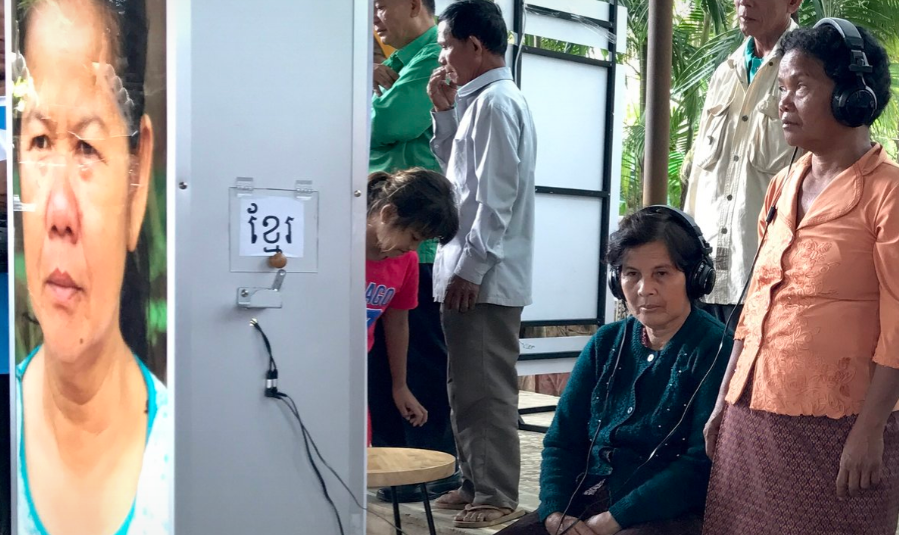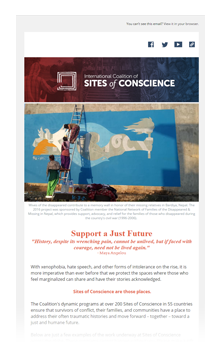The Coalition is pleased to announce that four Sites of Conscience were awarded Project Support Fund grants (PSF) in 2021. Awardees will each receive grants of up to $10,000 to implement innovative Sites of Conscience projects that enable local communities to emerge stronger from COVID-19.
Since 2008, the Coalition has funded over 100 PSF grants, including exhibitions on the Martial Law era under Ferdinand Marcos in the Philippines, youth-targeted radio and digital media programs addressing social issues like HIV/AIDS, and memorialization projects honoring the thousands of Georgians who were imprisoned during “Stalin’s Purge”.
Below are the recipients of this year’s awards.
Arch Street Meeting House Preservation Trust (US):
 “I-676 Community Conversations – Use of Force, Reconciliation and Consensus”
“I-676 Community Conversations – Use of Force, Reconciliation and Consensus”
In June 2020, following George Floyd’s murder, peaceful protestors in Philadelphia gathered to march on I-676, only to then be entrapped and brutally attacked by police officers. The project “I-676 Community Conversations – Use of Force, Reconciliation, and Consensus” addresses these acts of violence committed by the Philadelphia Police Department during the Black Lives Matter protests. To promote community healing during a difficult time such as Covid-19, the Arch Street Meeting House Preservation Trust will carry out a series of community meetings over a period of six months with activists, social justice leaders, and local law enforcement to establish a dialogue among these groups through art-driven methodologies.
To view a Facebook Live interview with Arch Street Meeting House about their project, click here.
Devoir de Mémoire (Haïti) :
“Nostalgia: commemoration through music, a podcast”
In Haiti, school closures and lack of access to education due to the security situation in the country and COVID-19 have left youth extremely isolated. The “Nostalgia: Commemoration Through Music, a Podcast” project will address COVID-19’s impact on this community while confronting the effects of revisionism and correcting false narratives of everyday struggles in Haiti. Over a period of nine months, Devoir de Mémoire will develop a podcast to memorialize forgotten histories and give young Haitians a thorough understanding of the legacies of abusive systems so that they can reshape their futures for the better. The podcast will use music as a story-telling vehicle and an inter-generational bridge.
To view a Facebook Live interview with Devoir de Mémoire about their project, click here.
Kdei Karuna Organization (Cambodia):
“Community Social Welfare Support during Covid-19 Pandemic”
In Cambodia, a culture of silence still surrounds the brutal Khmer Rouge (KR) regime (1975-1979). Unfortunately, COVID-19 and the country’s response to it have caused many of the regime’s victims to relive their trauma. As a result, mental health support is needed now more than ever. “Community Social Welfare Support during the Covid-19 Pandemic” will provide direct mental health relief to individuals and communities affected by the KR regime by strengthening community-based support and online counseling.
 Over a period of nine months, Kdei Karuna will train fifteen local facilitators to lead online trainings and in-person counseling services to build community resilience among KR survivors and their extended families, filling a gap of specialized welfare support for KR-survivors, especially in rural areas.
Over a period of nine months, Kdei Karuna will train fifteen local facilitators to lead online trainings and in-person counseling services to build community resilience among KR survivors and their extended families, filling a gap of specialized welfare support for KR-survivors, especially in rural areas.
To view a Facebook Live with Kdei Karuna about their project, click here.
Trust for Indigenous Culture and Health – TICAH (Kenya):
“Empowering children and communities to lead in creating a safe and GBV free environment during the COVID 19 pandemic”
Sexual and domestic violence negatively impacts the physical, emotional, and psychological well-being of children – violating their right to dignity, freedom and peace, and a life free of inhumane treatment. In Kenya, cases of sexual and domestic violence against children have been on the rise due to COVID-19, with children in poor households facing the greatest risks. Through creating safe spaces for intergenerational dialogues and human rights education, the project seeks to strengthen the capacity of parents, children, and community leaders in the community of Majengo to design and implement community-level actions that protect children from violence.
To view a Facebook Live with TICAH about their project, click here.

